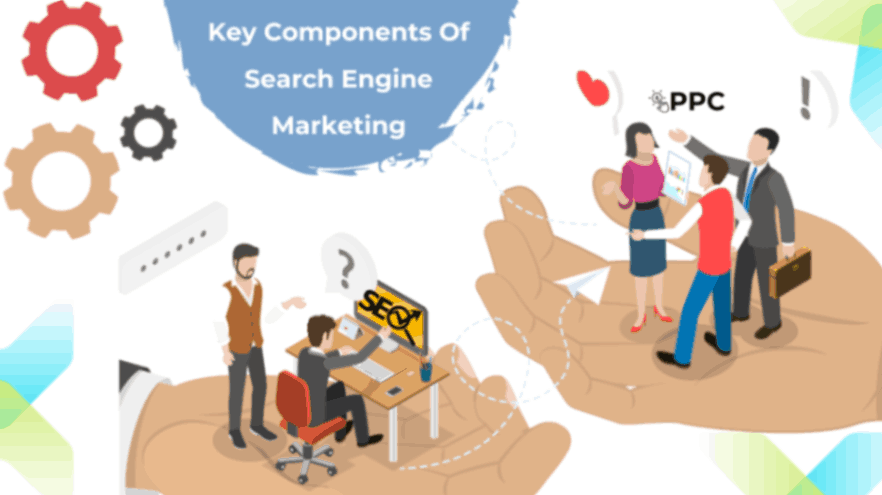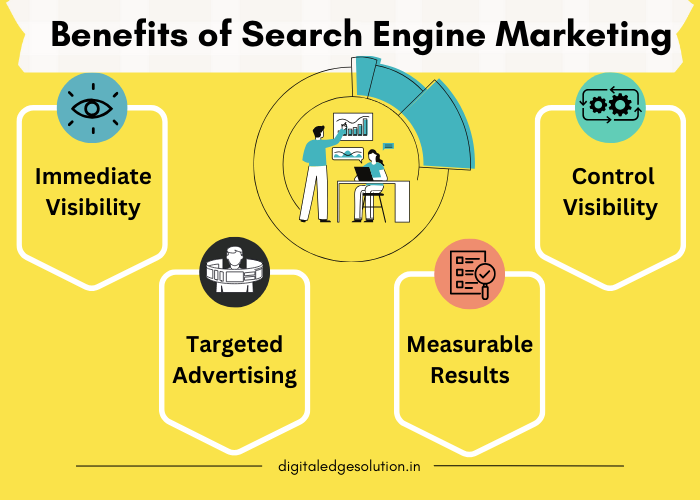Introduction
In the vast digital landscape, where millions of users turn to search engines daily for information, products, and services, businesses strive to be prominently featured when potential customers are looking. This is where Search Engine Marketing comes into play as a dynamic and results-driven strategy.
Search Engine Marketing
Search Engine Marketing (SEM) encompasses a range of activities aimed at promoting websites through increased visibility on search engine results pages (SERPs). The primary goal is to enhance a website’s visibility to a target audience through both paid and unpaid efforts.
Key Components of Search Engine Marketing:

Search Engine Optimization (SEO)
SEO is the organic component of search engine marketing, focusing on optimizing a website’s content, structure, and overall online presence to rank higher in unpaid search results. It involves keyword optimization, content creation, and technical enhancements to improve search engine rankings.
Pay-Per-Click (PPC) Advertising
PPC is the paid component of SEM, where advertisers bid on keywords to have their ads displayed in search engine results. Advertisers pay a fee each time a user clicks on their ad, providing a highly measurable and targeted approach to online advertising.
Key Elements in Search Engine Marketing Implementation:

Keywords and Targeting
Identifying and targeting relevant keywords is fundamental to SEM. Advertisers select keywords related to their products or services, ensuring their ads are shown to users actively searching for those terms.
Ad Copy and Creatives
Crafting compelling ad copy that resonates with the target audience is crucial. Advertisers aim to capture attention, convey value propositions, and entice users to click through to their websites.
Landing Page Optimization
Ensuring that the landing pages users reach after clicking on an ad are optimized for conversions is essential. A seamless user experience and alignment with the ad’s messaging contribute to higher conversion rates.
Budgeting and Bidding
SEM allows for precise control over budgets and bidding strategies. Advertisers set daily or monthly budgets, bid amounts for keywords, and can adjust these parameters based on performance and business goals.
Analytics and Measurement
SEM platforms provide robust analytics tools to track the performance of campaigns. Metrics such as click-through rate (CTR), conversion rate, and return on investment (ROI) offer insights for continuous optimization.
Benefits of Search Engine Marketing:

Immediate Visibility
SEM provides a rapid way to gain visibility on search engines. Paid ads appear prominently in search results, ensuring immediate exposure to potential customers.
Targeted Advertising
SEM enables precise targeting based on factors such as location, device, and user behavior. This ensures that ads are presented to a highly relevant audience.
Measurable Results
The performance of SEM campaigns is highly measurable. Advertisers can track clicks, impressions, conversions, and other key metrics, allowing for data-driven decision-making.
Flexibility and Control
Advertisers have control over their SEM campaigns, with the ability to adjust budgets, bids, and targeting parameters in real-time. This flexibility allows for quick adaptation to changing market conditions.
Conclusion
Search engine marketing stands as a formidable tool for businesses seeking to amplify their online presence. Whether through the strategic optimization of organic search results or the targeted precision of paid advertising, SEM empowers businesses to connect with their audience, drive traffic, and achieve measurable success in the competitive online marketplace. As technology continues to advance, the role of SEM remains pivotal in shaping the digital success story for businesses of all sizes.